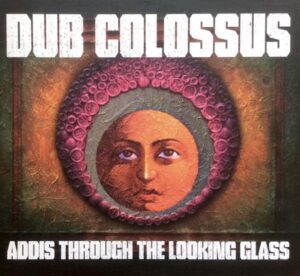Every new year is an opportunity to renew ourselves: to plan new experiences, start a new exercise routine, or quit drinking (at least temporarily). It’s also a great time to refresh your sonic palate. This installment of the Indie Playlist features an uncommonly wide range of music you may have never heard before, from genre-bending Japanese power pop to a reggae-inflected Amharic love song and a shimmering Christian rave track. New year, new you, new music: sounds like 2025 is off to a great start already. Listen along at https://spti.fi/0P8ZzjL.
‘Wey Fekir,’ Dub Colossus

The opening notes of Dub Colossus’s “Wey Fekir” fade in softly as a sunrise, a gentle strum of strings accompanied by a flute as clear and bright as birdsong on a sunny morning. Would you want one of the first songs you hear in this new year to start any other way?
A studio project-turned-live band led by the late composer, guitarist, and producer Nick “Dubulah” Page, Dub Colossus released half a dozen albums and a handful of EPs and singles over the 2010s. “Wey Fekir” is the opening track from the group’s 2011 album Addis Through the Looking Glass and, indeed, the song sounds like stepping into a gloriously inverted world where the day is always just beginning and your lover is sleeping warmly at your side.
The lyrics — sung in Amharic, the lingua franca of Ethiopia, by vocalist Sintayehu “Mimi” Zenebe — begin with “I want to wrap myself around you like a vine” and express the all-encompassing feeling of being in love and finding refuge in a lover’s arms. Given that the song’s title can mean both “Oh my love” and “Oh my God” in different dialects, there might also be something here that transcends the corporeal.
As the precarious balance of life on this planet continues to shift and wobble, “Wey Fekir” feels like a safe harbor. And if an ensemble helmed by a London-based producer combining Jamaican reggae and dancehall with Ethiopian jazz and pop doesn’t sound like a recipe for world peace, I don’t know what does. —John D’Addario
‘No Way to Relax When You Are on Fire,’ Dora Jar

The door has opened on a new year. So, it’s the perfect time to listen to “No Way to Relax When You Are on Fire” by Dora Jar (get it?), the title track of her debut album. The instrumental backing feels both nostalgic and forward moving with its warm and expansive guitar chords and a drum set that chugs along like a train. The song’s pining, restless quality pairs well with this dark season. I know I’m not the only one anxiously pacing my apartment, missing the sun.
It’s a love song, I think. But not love, exactly. It’s more like an exploration of a brief but overwhelming crush. Caught up in the tide of her daydreaming, Jar experiences all the highs and lows of infatuation. By the end of the song, she’s been left alone, and she knows she has to move on. “Everything’s changing,” she sings. “It’s gone in a flicker.”
Much like the object of Jar’s desire, the old year has passed. It’s time to fall in love with something new. And who knows? Maybe it will love us back. —Eve Samaha
‘The Work,’ Issy Wood

“I wanna be the victim, the aggressor, and the respite, and the stressor, and the worst one, then the better,” croons electro-pop musician and visual artist Issy Wood in the opening seconds of “The Work,” the lead track of her 2024 album, Accidental American. (Wood painted the American flag-stamped cookie cutout cover art.)
The simultaneous bite and vulnerability of those words dissolve into the eclectic charge of an electronic chord progression before Wood tells the story of an unspoken performance she played to hold a relationship together. “You’ve no idea how hard I tried to be someone you’d like,” she repeats. “If I made it look easy, I guess I’m doing it right.”
It’s unclear if the relationship is with another person, her art, her American citizenship, or herself. Maybe all of them. Maybe none. What matters is how Wood unravels her trust issues, guardedness, self-sacrifice, and isolation, slowly recognizing them as symptoms of avoiding the real work of tending to herself.
“The Work” is a breakup song. It’s not upbeat, but it’s the kind of track you could walk miles to, looping its gritty vibe as you turn the page on a person, or a pattern, or a year.
The song ends where it began, with Wood repeating that first line like a mantra, adding, “I guess it’s me and myself forever.” You’ve got you, babe, whatever 2025 has in store. —Aden Choate
‘Laced Up,’ Tsubi Club

There’s a lot that I’m anxious about for 2025, which is why I chose “Laced Up” — the sophomore track by Tsubi Club (a.k.a. Tsunami Bitch Club) — as my anthem for ringing it in. The genre-bending earworm is an ode to defiance, with a punk spirit that sears through all of vocalist-producer Soren’s lyrics: “I won’t spend all my money on some shit I don’t want,” he raps over a thumping house beat. “I won’t stay where it’s sunny if I can’t leave the block.”
But the definitive way to experience “Laced Up” is through its music video, which more than triples the song’s runtime by adding an ethereal chamber intro and a doomy post-rock buildup to its already chaotic mix of genres. A ticking clock underscores the latter, which increases in both valence and intensity before climaxing in a raucous action sequence inspired by classic anime like FLCL and Neon Genesis Evangelion.
If there’s one thing to be gleaned from Tsubi’s brazen energy, it’s that dissent doesn’t have to be joyless. There’s an undeniable goofiness to the song’s structure, but it’s delivered with such confidence that I can’t help but tighten my shoes and dance along. Sometimes, that’s the most punk thing there is. —Parker Mumford
‘You’re Gonna Be OK,’ Rave Jesus

I always enjoy a good mashup of the sacred and the profane. But I’ve never been into rave music, and although I’m a Christian, I’ll be the first to admit that efforts to Christianize secular music are often cringey. Rave Jesus asserts that raves and Jesus are “a match made in heaven.” Their music has me convinced.
Rave Jesus is the project of Topher Jones, who in a recent interview said that as a DJ he often felt God more at a club on Saturday night than at church the next morning. In a recent EP, he brings church to the dance floor in six songs that incorporate gospel, African beats, and prayer with the ecstatic, trance-like rhythms of rave music.
Some tracks, like “You’re Gonna Be OK,” provide a fitting soundtrack to a new year in which we’re all hoping to shake off the gloom of 2024. “You never know what tomorrow holds,” a voice repeats. When it crescendos, the voice repeats the title like a mantra that feels reassuring even if we’re hoping for more than just OK this year.
But it’s the ecstasy and celebration of the beat that provides the most reassurance. Like dancing, it’s a reminder that celebration and joy are important resources in dark times — and that hope, exuberance, and transcendence can be found on both the dance floor and through religious experience. —Abraham Storer
‘Who Knows Where the Time Goes,’ Sandy Denny with Fairport Convention

Who isn’t a little afraid of time? With the buzzy warmth of the holidays shrinking into the background and the deep, cold well of winter lurking ahead, it’s difficult not to dwell on time past and passing.
“I have no thought of time,” sings English folk singer-songwriter Sandy Denny in her 1969 recording of “Who Knows Where the Time Goes” with Fairport Convention. Denny wrote the song — one of her first — when she was 19, a few years before she joined the group. She died in 1978 at 31. “Who Knows Where the Time Goes” was the last song she sang at her last performance.
Some might think it’s a sad song, but I don’t — at least not this version. (Denny also recorded more plaintive versions as a solo artist.) Here, her voice is as easy as a daydream. “Across the evening sky/ All the birds are leaving,” she sings. Her “fickle friends” will leave, too — but she will stay where she is. Without counting the time, spring will arrive again.
She repeats the song’s title question in its sigh of a chorus. Such an unknown can be frightening. That’s why we make resolutions for the new year — to better claim our time, to know it better before it happens. When Denny sings “I have no fear of time,” it’s comforting to know someone else feels that way. —Dorothea Samaha



